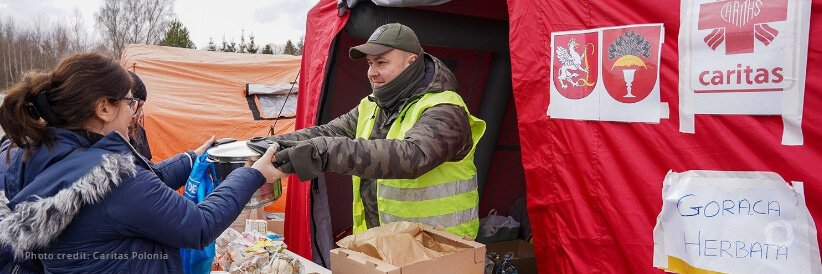With the escalation of the conflict in Ukraine last year on February 24, the Caritas network in Ukraine and in the neighbouring countries of Poland, Romania, Moldova, Czech Republic, Slovakia, Bulgaria and Hungary, have worked tirelessly to provide humanitarian assistance to families and individuals impacted by violence and unrest in the eastern European region.
“This past year has been a difficult one. It was a year that was filled with suffering and challenges, pain and loss, with difficult situations. At the same time, it was also filled with great solidarity, with a great expression of hope, of faith, of love and assistance to one another,” says President of Caritas Ukraine Tetiana Stawnychy.
Within Ukraine, over 3 million beneficiaries have received humanitarian support from Caritas Ukraine and Caritas-Spes combined. Around 3.7 million food and non-food items (NFIs) were provided; 637,000 received shelter; 192,000 were given health and psychosocial support; 377,000 were granted protection services; over 1.5 million people received Wash items; and 107,600 received cash assistance.
“Every day, every Ukrainian and every Caritas-Spes employee performs a crucial service to save people, and we are not alone in this. We strongly feel your support every day. You have been walking with us on this Way of the Cross for 365 days, and we know that you will not leave us alone in the future,” says Director of Caritas-Spes Fr Vyacheslav Grynevych.
Within the first week of the conflict, among those fleeing Ukraine around 77,000 travelled and queued at the Polish border. Several Caritas staff and volunteers were present there to meet them at “Tents of Hope” where hot food and drinks, medicines, hygiene items, warm clothes and a place to rest were offered. To date, Caritas Poland has delivered: over 15.7 million food and non-food items; around 255,000 protection services; 176,000 shelter support; 64,000 health and psycho-social support; and over 7,287 education services to beneficiaries.
Caritas Romania currently has six social service centres for refugees from Ukraine in Bucharest, Baia Mare, Cluj, Iasi, Oradea and Sighetu Marmatiei. To date, around 11,900 food and non-food items have been distributed; 2,700 received wash items; 2,600 have had shelter support; 2,500 received protection services; and 537 beneficiaries have obtained education services to beneficiaries.
In Moldova, the geographic focus of humanitarian assistance is in and around the capital city of Chisinau, where many refugees have arrived and stayed. Caritas Moldova has provided beneficiaries with around: 135,000 protection services; 34,300 food and non-food items; 22,600 health and psycho-social support; 10,900 shelter services; and 2,700 wash items.
Caritas Slovakia, through its diocesan network, has provided the following services over the last year: 66,100 food and non-food items; 36,500 wash items; 7,900 education services; 3,400 protection services; 890 shelter services; and 140 health and psycho-social support services.
Since the outbreak of the war, Caritas Czech Republic has provided beneficiaries approximately: 13,300 food and non-food items; 8,830 protection services; 4,500 wash items; 1,170 health and psycho-social support; 1,000 education services; and 150 shelter support. Currently, a goal of Caritas is to find permanent accommodation in apartments instead of temporary solutions for families as well as permanent employment to ensure that children can attend school locally.
Since the onset of the crisis, Caritas Bulgaria – through its diocesan and parish structures and the local Catholic Church – has concentrated its efforts to meet the basic needs of refugees and displaced persons. To date, they have provided beneficiaries with 13,700 protection services; 3,600 food and non-food items; 1,350 health and psycho-social support; 870 shelter support as well as 640 education services.
Since last year, Caritas Hungary has provided support services at helping points at the country’s borders and in Budapest, as well as rental assistance, voucher assistance and access to economic and social services. One year on since the outbreak of war in Ukraine, the Caritas confederation is calling on further solidarity from the international community. Continued support is still necessary for those displaced within Ukraine and those in neighbouring countries who are trying to rebuild their lives following the destruction of their own homes and cities.
“The number of services delivered over the last year is truly remarkable. However, what Caritas gives is much more than assistance. We accompany people before, during and after a crisis happens. We belong to the communities we serve and we will continue to bring that sense of hope, warmth and humanity to the people suffering as a result of this unrest in Ukraine,” says Caritas Internationalis Temporary Co-Administrator Amparo Alonso Escobar.

